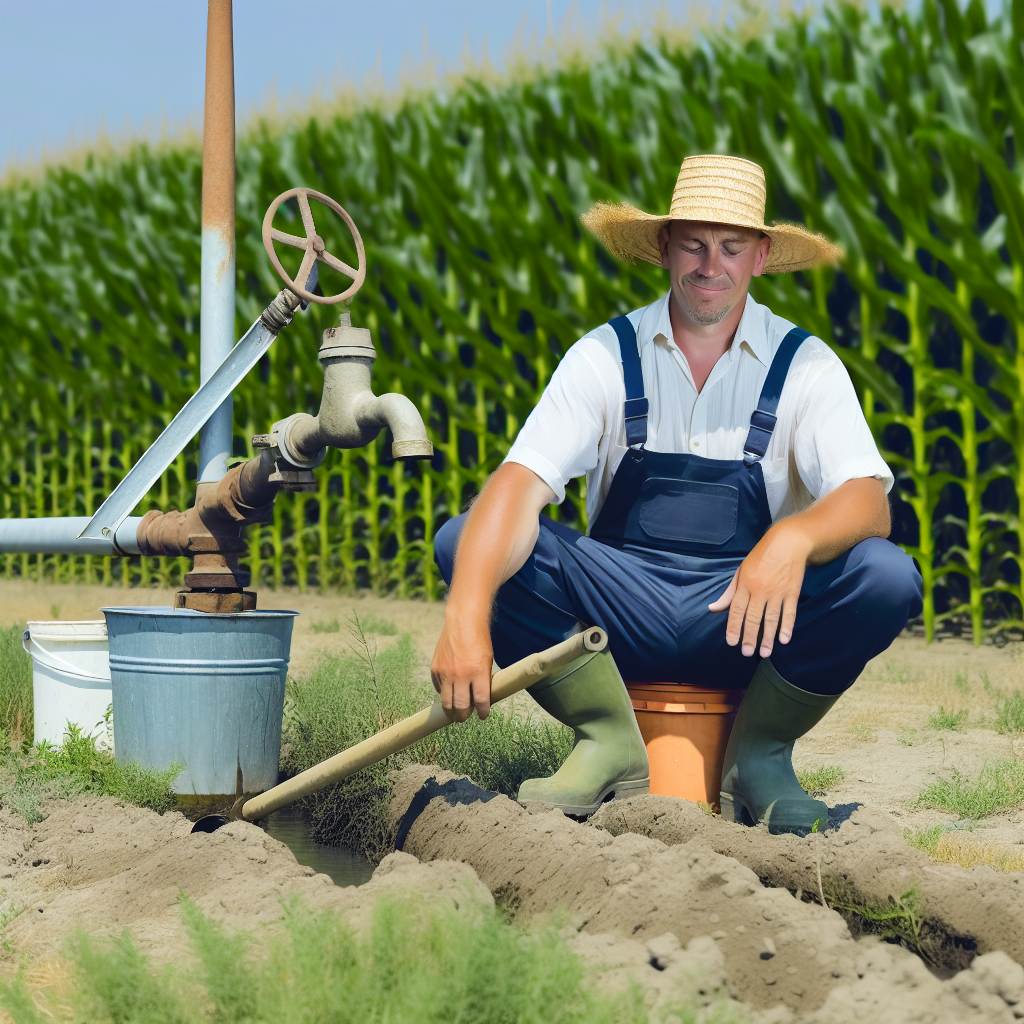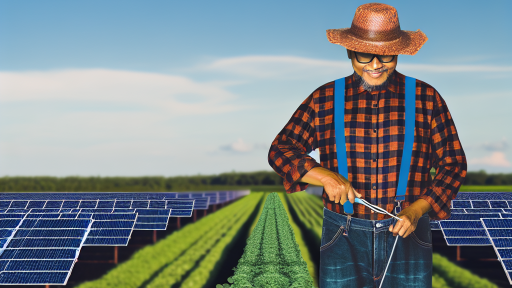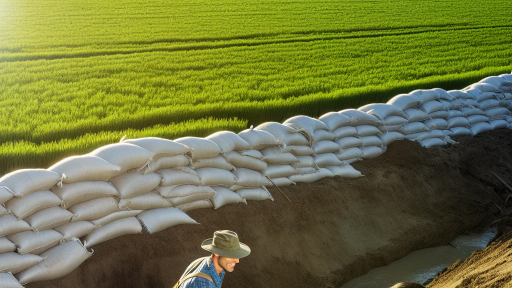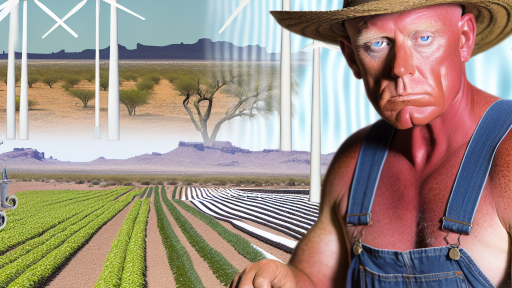Introduction to Water Management in Agriculture
Water management plays a crucial role in agricultural productivity.
Farmers rely on effective strategies to optimize water usage.
Efficient water management enhances crop health and yields.
It conserves water resources, ensuring sustainability.
In many regions, water scarcity presents ongoing challenges.
Thus, better management practices become increasingly essential.
The Importance of Water Management
Proper water management directly impacts crop growth.
Irrigation and drainage systems require careful planning.
Effective practices help prevent waterlogging and salinization.
Additionally, they reduce vulnerability to drought.
Farmers can thus maintain productivity under varying weather conditions.
Strategies for Effective Water Management
Several strategies can improve water usage efficiency.
Firstly, rainwater harvesting captures available rainfall.
Secondly, drip irrigation delivers water directly to plant roots.
Thirdly, soil moisture sensors monitor water needs accurately.
Transform Your Agribusiness
Unlock your farm's potential with expert advice tailored to your needs. Get actionable steps that drive real results.
Get StartedFarmers should also consider crop rotation for better water utilization.
Lastly, mulching helps retain soil moisture effectively.
Technology in Water Management
Modern technology plays a vital role in efficient water management.
Precision agriculture uses data to optimize irrigation schedules.
Drones can assess water distribution in fields swiftly.
GIS mapping assists in analyzing water resources effectively.
Adopting such technologies helps farmers make informed decisions.
Understanding Water Needs of Different Crops
Importance of Water Management
Effective water management safeguards crop health and productivity.
Therefore, understanding the specific water needs of different crops is essential.
It helps farmers make informed decisions about irrigation practices.
In turn, this leads to better yield and quality of produce.
Water Requirements by Crop Type
Different crops have varying water requirements throughout their growth stages.
Cereal crops, like wheat and corn, need consistent moisture for optimal growth.
Root crops, including potatoes and carrots, require less water but still need adequate supply.
Fruiting crops, such as tomatoes and peppers, benefit from regular watering during specific phases.
Factors Influencing Water Needs
Several factors affect how much water a crop requires.
Soil type plays a significant role in water retention and drainage.
Climate conditions, such as temperature and humidity, directly impact evaporation rates.
Even planting density can influence the overall water needs of a crop.
Strategies for Managing Water Requirements
Farmers can adopt various strategies to manage water efficiently.
- Implementing drip irrigation systems can minimize water loss.
- Using mulch can help retain moisture in the soil.
- Crop rotation can improve soil structure and reduce water demands.
Monitoring Soil Moisture
Regularly monitoring soil moisture levels facilitates timely irrigation.
Farmers should use moisture sensors to assess soil needs accurately.
This practice prevents overwatering and underwatering effectively.
Regional Variability in Water Needs
Water needs also vary based on regional climate and geography.
Showcase Your Farming Business
Publish your professional farming services profile on our blog for a one-time fee of $200 and reach a dedicated audience of farmers and agribusiness owners.
Publish Your ProfileFor instance, crops in arid regions may need more irrigation compared to wetter areas.
Understanding local weather patterns assists farmers in planning their irrigation schedules.
Seasonal Considerations
Crops often require different amounts of water in various seasons.
Spring typically sees higher water needs due to active growth.
Conversely, during fall, many crops may reduce their water intake as they mature.
Best Practices for Irrigation Scheduling
Understanding the Basics of Irrigation
Irrigation is essential for crop growth in dry seasons.
It ensures that plants receive adequate water.
This practice helps to minimize drought stress.
Additionally, it increases crop yields significantly.
Choosing the Right Irrigation Method
Different crops require various irrigation methods.
For example, drip irrigation conserves water efficiently.
In contrast, flood irrigation spreads water evenly across fields.
Farmers should assess their crop and soil needs.
Scheduling Irrigation Wisely
Timing is critical for effective irrigation scheduling.
Farmers should monitor weather patterns regularly.
Using weather forecasts helps in planning irrigation.
Implementing a fixed schedule may waste water resources.
S soil Moisture Monitoring
Ssoil moisture sensors can provide valuable data.
These devices help determine when to irrigate.
Farmers can prevent overwatering by checking moisture levels.
Consequently, this ensures crop health and sustainability.
Adjusting Based on Crop Growth Stages
Crops have varying water needs during different growth stages.
Seedlings require less water compared to mature plants.
Adjusting irrigation based on growth stages maximizes efficiency.
This practice contributes to higher productivity in the long run.
Utilizing Technology for Efficient Management
Modern technology offers tools that streamline irrigation.
Automated systems adjust watering schedules automatically.
Such innovations save both time and resources.
Farmers should explore options like smart irrigation controllers.
Implementing Water Conservation Techniques
Water conservation is crucial for sustainable agriculture.
Cover crops can reduce evaporation and runoff.
Additionally, rainwater harvesting can supplement irrigation needs.
Farmers benefit from being proactive about water use.
Learn More: Enhancing Soil Health to Reduce Farming Emissions
Techniques for Efficient Irrigation
Drip Irrigation
Drip irrigation delivers water directly to the plant roots.
This method significantly reduces water waste.
Farmers can adjust the flow rate based on plant needs.
Additionally, drip systems can be automated.
This technology allows for precise control over watering schedules.
Moreover, it minimizes weed growth by keeping soil dry.
Showcase Your Farming Business
Publish your professional farming services profile on our blog for a one-time fee of $200 and reach a dedicated audience of farmers and agribusiness owners.
Publish Your ProfileFarmers benefit from improved crop yields as a direct result.
Sprinkler Irrigation
Sprinkler irrigation mimics natural rainfall.
This method disperses water through a network of pipes and sprinklers.
It covers large areas quickly and efficiently.
However, some water loss occurs due to evaporation and wind.
Farmers should choose suitable sprinkler types for their crops.
Additionally, they can implement timers to optimize usage.
Comparative Analysis
Comparing drip and sprinkler systems aids in decision-making.
Drip irrigation is more efficient but may have higher installation costs.
In contrast, sprinkler systems offer greater versatility for various terrains.
Both techniques have unique advantages depending on crop types.
Farmers should assess their specific needs carefully.
Future Innovations
Advancements in technology promise to enhance irrigation methods.
Smart irrigation systems integrate real-time data for optimal watering.
Farmers can use sensors to monitor soil moisture levels effectively.
Furthermore, mobile applications facilitate remote management.
Such innovations increase sustainability in agriculture.
Find Out More: Integrating Wetlands for Natural Flood Control on Farms
Rainwater Harvesting: Benefits and Implementation
Overview of Rainwater Harvesting
Rainwater harvesting captures rainwater for later use.
This method effectively reduces reliance on conventional water sources.
Moreover, it helps conserve groundwater supplies.
Farmers can use harvested rainwater for irrigation.
Additionally, it provides water during dry spells.
Benefits of Rainwater Harvesting
Rainwater harvesting offers numerous benefits for crop protection.
Firstly, it decreases water bills for farmers.
This method utilizes a free and renewable resource.
Secondly, it enhances water security during droughts.
Farmers can sustain their crops even in water-scarce conditions.
Furthermore, rainwater reduces stormwater runoff.
This can help prevent soil erosion and nutrient loss.
Implementing Rainwater Harvesting
Implementing rainwater harvesting requires careful planning.
Firstly, assess the roof area to collect sufficient water.
The larger the roof, the more water you can collect.
Secondly, select an appropriate storage tank.
Consider factors such as size, material, and location.
Next, install a proper filtration system.
This ensures the harvested water is clean for agricultural use.
Maintaining the Rainwater Harvesting System
Regular maintenance is vital for an effective system.
Clean the gutters and downspouts frequently.
This prevents debris from entering the storage tank.
Showcase Your Farming Business
Publish your professional farming services profile on our blog for a one-time fee of $200 and reach a dedicated audience of farmers and agribusiness owners.
Publish Your ProfileInspect the tank for leaks or damage regularly.
Lastly, ensure the filtration system functions properly.
With proper care, the system can last many years.
Uncover the Details: Economic Losses From Climate Variability In Farming
Soil Management for Improved Water Retention
Understanding Soil Composition
Soyl composition significantly affects water retention in agricultural fields.
Healthy soil typically contains organic matter, clay, sand, and silt.
Organic matter enhances soil structure, allowing better moisture absorption.
Meanwhile, clay particles retain more water compared to sandy soils.
Enhancing Soil Structure
Improving soil structure promotes moisture conservation in the top layers.
Farmers should consider practices like no-till farming and cover cropping.
No-till techniques reduce soil disruption and improve water infiltration.
Cover crops protect the soil from erosion and enhance organic matter.
Implementing Mulching Techniques
Mulching is an effective practice for retaining moisture in the soil.
Organic mulches, such as straw or wood chips, break down over time.
As a result, they improve soil health while conserving moisture.
Additionally, mulch can regulate soil temperature during extreme weather.
Utilizing Water Retention Techniques
Farmers can implement various water retention strategies.
For instance, planting contour crops helps minimize runoff.
Constructing swales and terraces captures and directs water effectively.
These methods enhance the landscape’s natural ability to absorb rainwater.
Regular Soil Testing
Conducting regular soil tests is crucial for optimal management.
Tests provide valuable information about nutrient levels and pH balance.
Based on the results, farmers can adjust their fertilization practices.
Proper fertilization promotes healthier plants with better water retention.
Explore Further: The Economic Case for Adopting Climate-Sensitive Farming

Utilizing Technology in Water Management
Sensors for Effective Monitoring
Sensors play a crucial role in modern agricultural water management.
They provide real-time data on soil moisture levels.
Farmers can adjust watering schedules based on accurate measurements.
Compatibility with mobile devices enhances usability for farmers.
Thus, embracing sensor technology improves efficiency and crop health.
Automation Systems for Irrigation Control
Automation systems significantly enhance irrigation management.
These systems allow for precise water application techniques.
Timers and smart controllers optimize watering frequency and duration.
This reduces water waste and lowers operational costs.
Consequently, automation contributes to sustainable farming practices.
Data Analytics and Decision Making
Data analytics provides valuable insights into water usage patterns.
Farmers can identify areas needing more or less water.
Predictive analytics helps in planning for seasonal variations.
Integrating data analytics improves overall water resource management.
By doing so, farmers can enhance productivity and conserve water.
Showcase Your Farming Business
Publish your professional farming services profile on our blog for a one-time fee of $200 and reach a dedicated audience of farmers and agribusiness owners.
Publish Your ProfileCase Studies in Technology Adoption
Many farms have successfully adopted technology for water management.
For instance, GreenFields Farm increased efficiency by 30%.
They implemented soil sensors and automated irrigation systems.
Similarly, FreshHarvest reduced their water usage through analytics.
These real-world examples demonstrate the benefits of technology.
Impact of Water Quality on Crop Health and Yield
Understanding Water Quality
Water quality significantly influences crop health and agricultural productivity.
Factors such as pH, salinity, and nutrient content play crucial roles.
Healthy crops thrive in balanced water conditions.
In contrast, poor water quality can lead to various growth issues.
Effects of Contaminated Water
Contaminated water can severely impair crop growth.
It may introduce pathogens that hinder plant development.
Additionally, toxic substances can accumulate in the soil.
This accumulation adversely affects crop yield and quality.
Salinity Challenges
High salinity levels pose a significant threat to agriculture.
Salt can stress plants and reduce water uptake.
Consequently, crops may exhibit stunted growth and yield loss.
Farmers should monitor salinity levels regularly.
Importance of Nutrients
Nutrients in water are vital for crop health.
Essential elements like nitrogen and phosphorus impact productivity.
Water rich in nutrients boosts growth and enhances yield.
However, excessive nutrients can lead to harmful algal blooms.
Testing Water Quality
Regular testing of water quality is essential for farmers.
Farmers should assess both chemical and biological characteristics.
Understanding water quality helps in making informed irrigation decisions.
Testing enables proactive management of potential issues.
Strategies for Improving Water Quality
Farmers can employ various strategies to enhance water quality.
- Implementing proper filtration systems is crucial.
- Utilizing natural water sources effectively can improve quality.
- Soil conservation practices help minimize runoff.
- Crop rotation fosters healthier ecosystems and water quality.
Effective Water Management Approaches
Proper water management practices lead to successful crop production.
Monitoring and improving water quality is essential for agricultural success.
Farmers must stay informed about the impact of water on crops.
By doing so, they can maximize yield and ensure sustainable farming.
Case Studies of Successful Water Management Practices
Irrigation Management in California
California farmers implemented advanced irrigation techniques.
They adopted drip irrigation systems to deliver water precisely.
This approach drastically reduced water waste during irrigation.
Farmers observed healthier crops and increased yields.
Such techniques also improved soil moisture retention.
Consequently, the farmers became more resilient to drought conditions.
Rainwater Harvesting in Australia
In Australia, farmers utilized rainwater harvesting systems.
This method captured runoff during the rainy season.
Farmers stored the water for future use in irrigation.
The approach significantly decreased dependency on groundwater.
Showcase Your Farming Business
Publish your professional farming services profile on our blog for a one-time fee of $200 and reach a dedicated audience of farmers and agribusiness owners.
Publish Your ProfileThus, crop production became more sustainable over time.
Water-Saving Practices in Israel
Israel stands out in innovative water management strategies.
The country implemented an extensive network of irrigation technologies.
Farmers employ sensors to monitor soil moisture levels.
This data informs irrigation scheduling, optimizing water use.
As a result, crop yields remain consistently high despite water scarcity.
Community Engagement in Mexico
In Mexico, a community collaborated to improve local water management.
Farmers participated in workshops to learn effective techniques.
They established rainwater collection systems for shared use.
This initiative fostered a sense of community responsibility.
Therefore, water conservation became a collective goal.
Integrated Water Resource Management in the Netherlands
The Netherlands employs integrated water resource management effectively.
Farmers work with local governments to manage water levels.
This collaboration ensures optimal irrigation practices across fields.
Crops benefit from controlled water distribution throughout the year.
In addition, this approach helps in flood prevention.
Additional Resources
Climate Impacts on Agriculture and Food Supply | US EPA
Climate impacts on agriculture | Minnesota Pollution Control Agency




